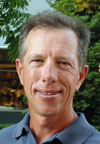Welcome to this edition of Perspectives, the e-newsletter of the
Stanford course, Perspectives in Assistive
Technology.
What
is the course? - Perspectives in Assistive Technology is a
Winter Quarter course at Stanford that explores issues surrounding the design,
development, and use of assistive technology benefitting people with
disabilities and seniors. More information can be found on the
course website.
Invitation to attend - You are invited to attend
all class lectures. They will be held in
Building 530, Classroom 127 on Tuesday and
Thursday afternoons at 4:15 to 5:30pm and are free and open to the
public.
Next lecture - Tuesday, January 24th at
4:15pm:
|

|
Design Challenges in Assistive
Technology
Douglas F. Schwandt, MS
Mechanical Engineer |
Abstract: Doug will
describe several examples of rehabilitation engineering projects he has worked
on - giving his personal insight into the design process, relating his
experiences, and passing along some helpful guiding advice he has received or
learned over the years.
Biosketch: Doug
Schwandt began his career in Rehabilitation Engineering with a Stanford ME210
(now ME310) student team design project creating the Handbike, the first
arm-powered, two-wheeled bicycle for individuals with lower-limb disabilities.
After graduation, he continued development of the Handbike as well as designing
various other devices in the Design Development group at the Palo Alto VA Rehab
R&D Center, including finger-spelling hands, hyper/hypo gravity devices and
specialty cycle ergometers. Over the years, Doug has also consulted on exciting
and challenging projects outside of the VA, including exercise concepts for
long-term space travel, MRI compatible fixtures and mobility devices, and
robots for physical therapy. No longer a VA employee, Doug continues to work
with universities and companies as a free-lance consulting design engineer, and
part-time as a springboard diving coach. His recent consulting projects include
working with Kinea Design on the
DARPA prosthetic
arm and haptic
interface, and contributing to the development of the
MDEA
gold medal winning M300 series Anti-Gravity Treadmill at
AlterG.
|

|
Assistive Technology in
Patient Care: Anti-Gravity Treadmill in Rehabilitation and
Training
Jacon C. Chun, MPT SCS ATC
CSCS
AlterG, Inc. - Clinical
Specialist |
Abstract: Jacon will
discuss applications for the Anti-Gravity Treadmill in physical therapy,
rehabilitation, and training. Using NASA patented Differential Air Pressure
technology, the Anti-Gravity Treadmill provides a new possibilities for the
treatment of orthopedic, neurologic, geriatric, and pediatric patients and
elevates expectations in sports traning. He will discuss how this technology
can help shape future medical care.
Biosketch: Jacon Chun
has over 12 years of experience in the medical field as a physical therapist
and athletic trainer, and is one of only a handful of therapists in the Bay
Area that hold certification as a Sports Clinical Specialist. He was on staff
in the Stanford Sports Medicine Department from 2003-2006, treating the
Cardinal student-athletes that participate in over 34 varsity sports. He was
introduced to the Anti-Gravity Treadmill at this time, and saw the benefits
first hand with the track athletes and post-surgical patients that used the
AlterG in their rehabilitation programs. Jacon currently serves as Clinical
Specialist for AlterG, educating people about all the fantastic applications
possible with the Anti-Gravity Treadmill. He is a practicing physical therapist
and owns two small private clinics in the East Bay.
|
 |